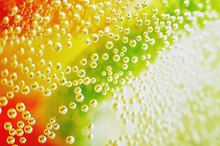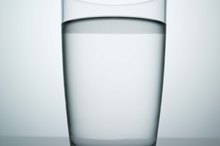What does fact checked mean?
At Healthfully, we strive to deliver objective content that is accurate and up-to-date. Our team periodically reviews articles in order to ensure content quality. The sources cited below consist of evidence from peer-reviewed journals, prominent medical organizations, academic associations, and government data.
The information contained on this site is for informational purposes only, and should not be used as a substitute for the advice of a professional health care provider. Please check with the appropriate physician regarding health questions and concerns. Although we strive to deliver accurate and up-to-date information, no guarantee to that effect is made.
Mediterranean Sea Salt Vs. Regular Table Salt
The differences between Mediterranean sea salt and table salt is primarily in the minerals available in each. According to Mayo Clinic nutritionist Katherine Zeratsky, the chemical makeup of the two types of salt is essentially the same: They are both, at their most basic level, sodium chloride 1. However, the minerals, additives and flavors in the two types of salt differ.
Processing
Mediterranean sea salt is obtained from the water of the Mediterranean Sea. The water is gathered in pans and allowed to evaporate in the sun. During the drying process, any foreign objects and organisms found in the water are filtered from the salty liquid to ensure it is pure. When the moisture is gone, the salt from the water remains. The salt is generally crushed and sold as-is, without any further processing. Table salt originates from underground salt mines. When it is removed from the mines, it is ground up and refined. The refining process removes many of the naturally occurring minerals in table salt, reducing it to simply sodium chloride.
- Mediterranean sea salt is obtained from the water of the Mediterranean Sea.
- During the drying process, any foreign objects and organisms found in the water are filtered from the salty liquid to ensure it is pure.
Natural Minerals
Is Sucanat Healthy?
Learn More
Mediterranean sea salt naturally contains a wide variety of minerals. Trace amounts of fluoride, potassium, iodine and magnesium can all be found in Mediterranean sea salt. Because the sea salt contains these extra minerals, its sodium chloride content is naturally lower per serving than regular table salt. Regular table salt contains no naturally occurring minerals because any minerals that were present are removed during the refining process.
- Mediterranean sea salt naturally contains a wide variety of minerals.
- Because the sea salt contains these extra minerals, its sodium chloride content is naturally lower per serving than regular table salt.
Additives
Mediterranean sea salt almost never contains any added minerals or chemicals. Regular table salt, on the other hand, frequently contains some additives to keep it from clumping and to extend its shelf life. Additionally, if a container of table salt says it is iodized, that means that iodine has been added to it. This is a common practice for table salt manufacturers. If a container of table salt is not iodized, then it contains sodium chloride only.
- Mediterranean sea salt almost never contains any added minerals or chemicals.
- If a container of table salt is not iodized, then it contains sodium chloride only.
Flavor
Nutritional Value of Diet Tonic Water
Learn More
According to Cook's Illustrated, many chefs debate the merits of sea salt versus regular table salt 2. The sea salt's flavor is influenced by the minerals present in the water. It's generally milder than regular table salt because it contains less sodium chloride per serving. Many cooks claim that the additives in table salt can negatively affect the flavor of their dishes. However, Cook's Illustrated found that the more the salts are diluted, the less noticeable the differences 2.
Health Benefits
Mayo Clinic nutritionist Katherine Zeratsky says that the human body needs about 200 milligrams of sodium chloride per day to remain healthy, but no more 1. Most people eat far too much sodium each day, mainly in processed and prepared foods. Zeratsky says that neither sea salt nor table salt has a particular nutritional edge because even in sea salt, the minerals are found in such small amounts that they don't add much to daily diet. However, eating too much of either can be bad for your health.
- Mayo Clinic nutritionist Katherine Zeratsky says that the human body needs about 200 milligrams of sodium chloride per day to remain healthy, but no more 1.
- Zeratsky says that neither sea salt nor table salt has a particular nutritional edge because even in sea salt, the minerals are found in such small amounts that they don't add much to daily diet.









